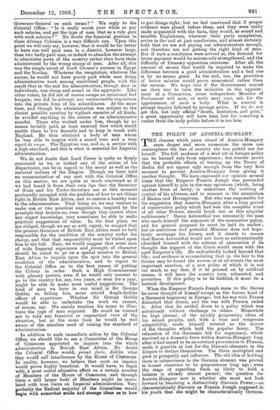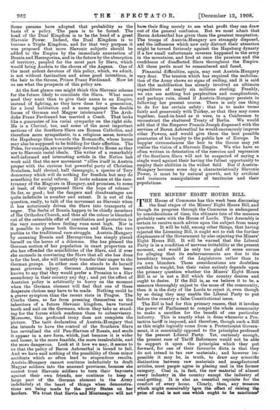THE POLICY OF AUSTRIA-HUNGARY. T HE chasms which yawn ahead of
Austria-Hungary seem deeper and more numerous the more one contemplates the line of country she has picked out for herself. The full madness of a mad act in foreign policy can be learned only from experience ; but wonder grows that the probable effects of tearing up the Treaty of Berlin did not appear ugly enough from the very first moment to prevent Austria-Hungary from giving it another thought. We have expressed our opinion several times that the Emperor Francis Joseph was persuaded against himself to join in the easy optimism (which, being another form of levity, is sometimes the undoing of cynics) of his advisers, and to consent to the annexation of Bosnia and Herzegovina. But who was responsible for the suggestion that Austria-Hungary, after a long period of conservative policy which had won the complete trust of all other Powers, should break out in this singular recklessness ? Baron Aehrenthal was necessarily the man who made himself the exponent of the annexation policy, and for general purposes he must be held its author ; but an ambitious and powerful Minister does not hope- lessly mortgage his future, and it stands to reason that Baron Aehrenthal would not have so enthusiastically identified himself with the scheme of annexation if he thought the support of the Court would cease with the aged Emperor's life. He undoubtedly looked beyond that life ; and evidence is accumulating that in the heir to the throne may be found the source, or at all events the most important sanction, of a new policy of which it is not too much to say that, if it be pressed on by artificial means, it will leave the country torn, exhausted, and powerless. If this policy is to be fulfilled, it must be a, natural development.
When the Emperor Francis Joseph came to the throne he never thought of himself except as the future head of a Germanic hegemony in Europe; but his war with France disturbed that dream, and the war with Prussia ended it. After that he settled down to a policy which was notoriously without challenge to others. Meanwhile he kept abreast of the quickly progressing ideas of his mixed peoples, and, with a wise and temperate adaptability, made himself revered as the mirror of the thoughts which held the popular fancy. The relaxation of the Germanic bid for supremacy, which survived as a domestic force within Austria-Hungary long after it had ceased to be an outward provocation to Prussia, made it possible at last for the Slavonic elements in the Empire to declare themselves. The Slays multiplied and grew in prosperity and influence. The old idea of holding them in subservience to the German element was proved to honest observers to be preposterous long ago ; even the stage of regarding them as likely to hold a balance is already almost passed; the question for Austria-Hungary now is whether she must not look forward to becoming a distinctively Slavonic Power,—as characteristically Slavonic as Francis Joseph supposed in his youth that she might be characteristically German.
Some persons have adopted that probability as the basis of a policy. The pace is to be forced. The head of the Dual Kingdom is to be the head of a great Slavonic Power. Indeed, the Dual Kingdom is to become a Triple Kingdom, and for that very purpose it was proposed that more Slavonic subjects should be added to the Empire by the immediate annexation of Bosnia, and Herzegovina, and in the future by the absorption of territory, peopled for the most part by Slays, which would bring Austria to the shores of the Aegean. One of the most ardent devotees of this policy, which, we admit, is not without fascination and some good intentions, is the heir to the throne, Prince Franz Ferdinand. Now let us see what the prospects of this policy are.
At the first glance one might think this Slavonic scheme for the future likely to conciliate the Slays. What more need they want than to give their name to an Empire, instead of fighting, as they have done for a generation, for a local habitation and a name against the double forces of German and Magyar intolerance ? The Arch- duke Franz Ferdinand has married a Czech. That looks like a guarantee of his racial sympathy on the right side. He is a Clerical, too, and some of the most important sections of the Southern Slays are Roman Catholics, and therefore more sympathetic, in a religious sense, towards the Hapsburgs than towards the Romanoffs, whose house may also be supposed to be bidding for their affection. The Poles, for example, are as intensely devoted to Rome as they are to Slavonic racial ideals. The writer of a remarkably well-informed and interesting article in the Nation last week said that the new movement "allies itself in Austria proper with the curious but powerful party of Christian Socialism, half clerical, half demagogic, a species of Tory democracy which will do nothirT for freedom but may do something for social reform. It looks askance at the race- tyranny of the Magyars in Hungary, and promises, to some at least, of their oppressed Slays the hope of release." So far, so good ; but the dangers and disadvantages are quite indefinite in number and extent. It is out of the question, really, to talk of the movement as Slavonic when it has notoriously driven the Slays into transports of anger. The Serbs of Bosnia happen to be chiefly members of the Orthodox Church, and thus all the colour is bleached out of the ostensible offer of conciliation and protection in the very country where feeling runs most high. Nor is it possible to please both Germans and Slays, the two parties to the traditional race-struggle. Austria-Hungary by annexing Bosnia and Herzegovina has simply placed herself on the horns of a dilemma. She has pleased the German section of her population in exact proportion as she has offended the sensibilities of the Slays, and if ever she succeeds in convincing the Slays that all she has done is for the best, she will instantly transfer their anger to the German groups. In either case she stands to do herself most grievous injury. German Austrians have been known to say that they would prefer a Prussian to a Slav ascendency in their country any day ; and yet the effect of Austrian policy is arbitrarily to hurry on the moment when the German element will feel that one of these desperate choices may have to be made. Nothing could be a graver symptom than the recent riots in Prague. The Czechs there, so far from preening themselves as the inheritors of a future Slavonic kingdom, have turned tooth and nail on the Germans, whom they take as stand- ing for the forces which condemn them to subserviency. Moreover, this profound irony does not complete the picture. The tacit declaration of Austria-Hungary that she intends to have the control of the Southern Slays has revitalised the old Pan-Slavism of Russia, and made it appear in a new form, which, just because it is wider and looser, is the more feasible, the more incalculable, and the more dangerous. Look at it how we may, it seems to us that the policy of Baron Aehrenthal is bound to fail. And we have said nothing of the possibility of those minor accidents which so often lead to stupendous results. Austria-Hungary cannot continue indefinitely to draft Magyar soldiers into the annexed provinces, because she cannot trust Slavonic soldiers to turn their bayonets against their own friends, nor continue to keep a large part of the German element in the Army indefinitely at the heart of things when demonstra- tions are being made by the petty States on her borders. We trust that Servia and Montenegro will not have their fling merely to see what profit they can draw out of the general confusion. But we must admit that Baron Aehrenthal has given them the greatest temptation. The troops of Austria-Hungary are strangely disposed, and the influences which now only distract their attention might be turned furiously against the Hapsburg dynasty if a few small unfortunate reverses happened to the army in the mountains, and fired at once the passions and the confidence of disaffected Slays throughout the Empire. All these perils must be remembered and faced.
Financial difficulties, again, may cost Austria-Hungary very dear. The tension which has required the mobilisa- tion of the Army shows no signs of ending, and it is said that the mobilisation has already involved an ultimate expenditure of nearly six millions sterling. Frankly, we can see nothing but perplexities and complications, and perhaps ruin, ahead if Austria-Hungary persists in following her present course. There is only one thing to do for her certain safety : that is to make terms fairly and generously with Turkey, so that they may come together, hand-in-hand as it were, to a Conference to reconstruct the shattered Treaty of Berlin. We would add that if the Emperor Francis Joseph dispensed with the services of Baron Aehrenthal he would enormously impress other Powers, and would give them the best possible guarantee of his loyalty to the public law of Europe. In happier circumstances the heir to the throne may yet realise the vision of a Slavonic Empire. We who have so often written in detestation of the coercion and repression of the. Southern Slays will not be suspected of saying a single word against their having the fullest opportunity to employ their abilities in the widest field. But if Austria- Hungary becomes some day a characteristically Slavonic Power, it must be by natural growth, not by artificial and insincere manipulations of territories and their populations.































































 Previous page
Previous page